Ecuador president finds audience in China
Updated: 2015-01-12 05:05
By Pu Zhendong in Beijing(China Daily Latin America)
|
||||||||
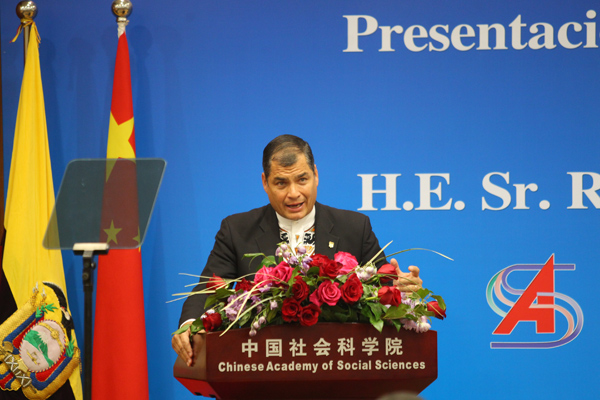 |
|
Ecuadorian President Rafael Correa Delgado spoke at the Chinese Academy of Social Sciences on Tuesday. Provided to China Daily |
In the midst of his push to further economic ties between China and Latin America, visiting Ecuadorian President Rafael Correa Delgado found a couple of hours to promote his book on state governance to Chinese readers.
The Mandarin edition of the book, under the name of Ecuador: From Banana Republic to the No Republic, premiered on Jan 5 at the Beijing-based Chinese Academy of Social Sciences.
Apart from his many achievements in leading Ecuadorian stability and social progress, Correa is also a leading economist keen to research in Latin American political economy.
The book, a collection of Correa's academic writings from 1993 to 2005, mainly reflects on Ecuador's economic modernization over past decades and lays out a development path toward justice and poverty alleviation.
Few Latin American social science writers have been translated into Chinese. Correa said he was "very honored and grateful to present his book in this wonderful language"at the premiere.
"We admire China's progress in solving poverty and its speed of growth into one of the richest countries in the world. Chinese readers will compare their own historic experiences with those of Latin America in the book,"Correa said.
Xu Shicheng, a research fellow of Latin American studies at the Chinese Academy of Social Sciences, said Correa's book reconsiders the setbacks of neo-liberal economic policies that once prevailed on the American continent.
"The book does not limit its academic scope to frustrations in Ecuador only, instead it tries to awaken other Latin American countries to further integrate and jointly address some common issues,"Xu said. "Now, the country is attaching more importance to value-added and knowledge industries to free the market from the yoke of mining and trade.”
In his book, Correa argues that countries should guide economic activities, instead of simply relying on the self-adjustment of the market to overcome socio-economic trouble.
"The neo-liberal freedom is non-intervention. However, there can be no real freedom without justice. Furthermore, in regions as inequitable as Latin America, only through justice can true freedom be reached,"Correa said.
This year, Ecuador holds the rotating chairmanship of the Community of Latin American and Caribbean States (CELAC). Correa was in Beijing to attend the first ministerial meeting of the China-CELAC Forum on Jan 8-9.
Correa said Latin America now calls for the establishment of new regional and global financial regimes so as to protect the interest of the developing countries, and in that vibrant integration process China can play an active role.
"We want to have our own ‘International Monetary Fund' to finance infrastructure projects in our region to avoid asking for money from traditional institutions with US influence. In this way, we will get sovereignty,"Correa said.
The BRICS (Brazil, Russia, India, China and South Africa) Development Bank, established last year under China's avid promotion, could be a good financing alternative for South American countries, he added.
Wang Weiguang, president of the Chinese Academy of Social Sciences, said the launch of the Mandarin edition will spark new interest in Ecuador from vast Chinese society.
"Both countries should learn from each other and bring our people together while seeking development and progress,"Wang said.
In 2013, bilateral trade surpassed $3.7 billion, with China becoming Ecuador's second largest trading partner. The South American country now receives roughly 15,000 Chinese tourists every year.
puzhendong@chinadaily.com.cn

 Time to become a woman
Time to become a woman
 The world in photos: Jan 5-11
The world in photos: Jan 5-11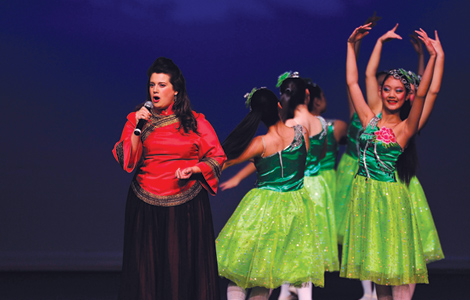
 Belting out a tune for Beijing
Belting out a tune for Beijing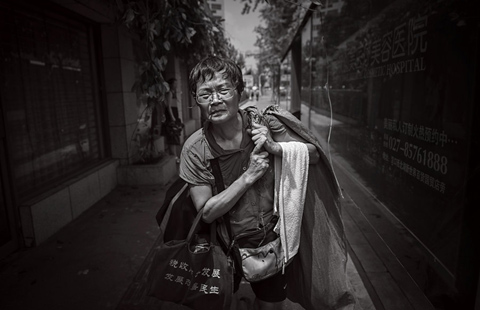
 66-year-old woman risks life, limb to pay off debt
66-year-old woman risks life, limb to pay off debt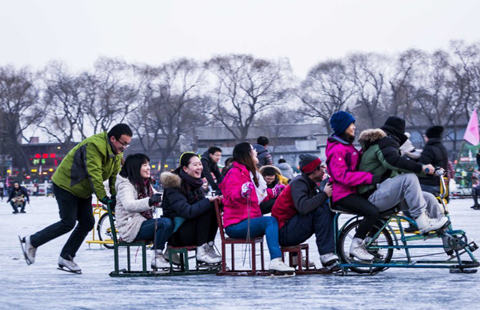
 Tourists heat up Beijing's frozen lake
Tourists heat up Beijing's frozen lake
 72nd Golden Globe Awards
72nd Golden Globe Awards
 Marching in solidarity: Paris 'unity rally' in photos
Marching in solidarity: Paris 'unity rally' in photos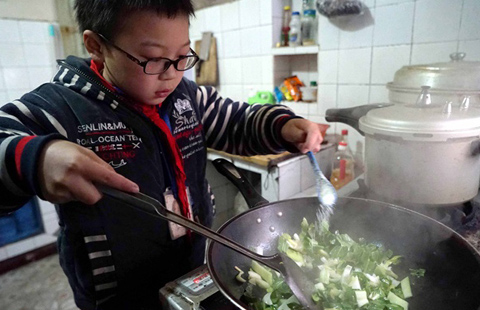
 We learn what is love from the 10-year-old schoolboy
We learn what is love from the 10-year-old schoolboy
Most Viewed
Editor's Picks

|

|
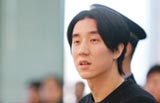
|

|

|
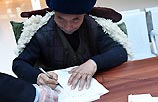
|
Today's Top News
Uber gets no grief yet in taxi-app ban
Washington's Chinatown in flux
Black box of crashed AirAsia jet retrieved
Experts praise reform of Chinese leaders, past and present
Ambitious course set for global airliner market
Chinese restaurants worry about cost of packaging ban
World leaders gather for Paris march
Better testing to secure safe blood supply
US Weekly

|

|







